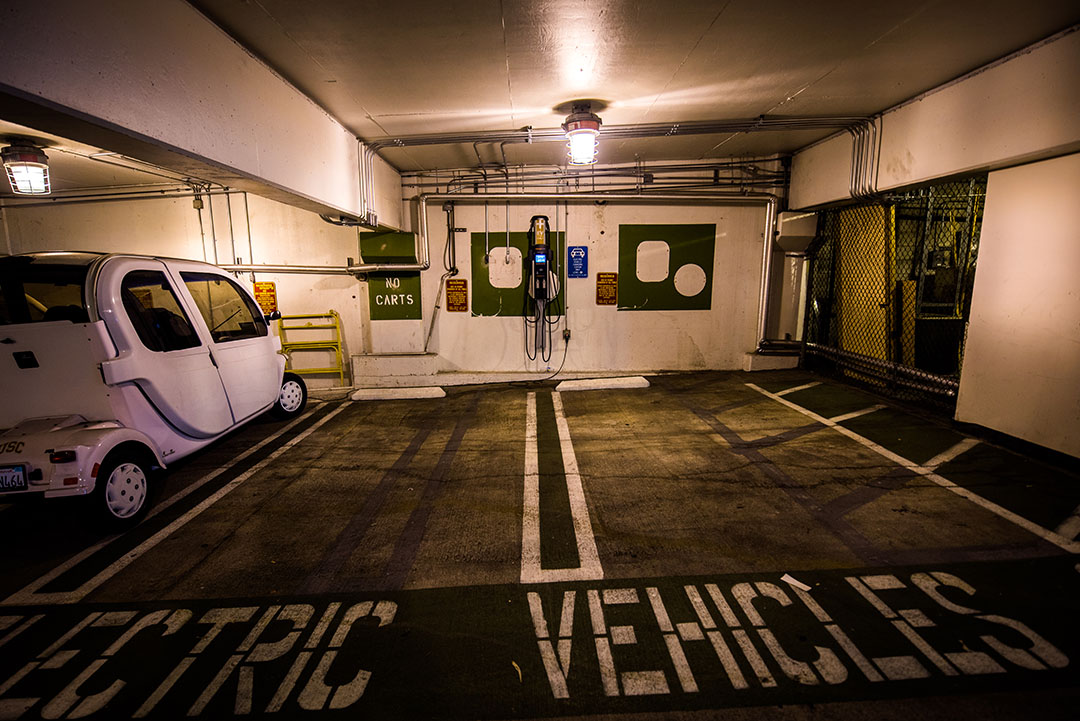USC expands on electric vehicle charging stations

Warren Poh | Daily Trojan
Powering up · Thirty-six parking spaces on the Health Sciences Campus are reserved to charge electric vehicles beginning this year.
USC Transportation has enhanced the University’s electrical infrastructure to meet the increasing demands for electric vehicle charging stations. This is in response to an increase in the number of people using electric vehicles at both the University Park Campus and the Health Sciences Campus. Currently, both campuses have a total of 58 charging spaces for electric vehicles.
“At this point, we are trying to catch up to demand,” said David Donovan, associate director of HSC. “There is already sufficient demand for more EV charging spaces, While we hope that people will use them and continue to grow the EV program, right now we are still trying to catch up to the existing demand.”
HSC has 36 charging spaces. The “level” of the station indicates the charging power — the higher the level, the more power and shorter charging time. The San Pablo parking structure at HSC, which has 32 Level II charging spaces, opened last January, while the remaining Level II charging spaces at HSC are in the Biggy parking structure.
“The Biggy structure is owned by the University, and we built four charging spaces there, which was the only number it could handle from the electrical infrastructure standpoint,” Donovan said. “When we built the new San Pablo structure, we built it keeping in mind the capacity to add new spaces.”
At the moment, there are 22 electric vehicle charging spaces at the UPC, two of which are level III charging stations. The level II spaces are located at the Figueroa Street structure, Grand Avenue structure, Royal Street structure, Downey Way structure, Lot 2 and Lot SSRI.
“One way to grow the program is to build new construction,” Donovan said. “Those are the big projects coming online next year.”
USC Transportation will be adding 56 level II charging stations at UPC by the end of Spring 2017. Twenty-four of these stations will be constructed at the University Village, and the remaining 32 stations will be at the USC Shrine building. In total, there will be 114 electric vehicle charging spaces available across both the campuses for those with a USC permit.
“The 114 EV charging spaces are as many as we can put in right now,” Donovan said. “We have already maxed out the University’s electrical infrastructure in terms of adding spaces to existing facilities.”
According to Donovan, if required later, they could add more new construction or do a massive redesign of the University’s existing electrical infrastructure, but that is not expected to happen anytime soon.
Even with an increase in the number of charging stations, the spaces are limited. Hence, any vehicle that is parked in that space and plugged into the charging station must be actively charging at all times. Otherwise, the owner may be cited for reserved space violation, according to the USC Transportation Rules & Regulations Handbook. The handbook also states that any vehicle parked in the EV space without a USC permit, without being plugged in and actively charging, or parked in an EV space after charging has been completed, will be fined $80 for a reserved space violation. The rate for using the charging station is $0.25/hr., in addition to the permit rate.
According to Karla Heidelberg, director of the USC Environmental Studies Program and associate professor of biological sciences and environmental studies at the Dornsife College of Letters, Arts and Sciences, USC’s commitment to installing more electric charging stations is a positive move that helps to promote awareness of alternative technologies that make the U.S. less dependent on oil imports.
“With much of our petroleum imports located in politically volatile countries, the United States is vulnerable to price spikes and supply disruptions,” Heidelberg wrote in an email to the Daily Trojan. “Facilitating the use of hybrid and plug-in electric vehicles instead of conventional vehicles can help reduce U.S. reliance on imported petroleum and increase energy security.”
Similarly, Heidelberg said, the use of electric vehicles will also help move the U.S. toward a more environmentally-friendly future by reducing emissions.
“As Provost Michael Quick has noted, we must prioritize and transform education to address difficult and intractable ‘wicked’ problems such as sustainability, so that our students become comfortable as future leaders that continue these beginning efforts,” Heidelberg wrote. “Hopefully this is one of many future steps to make USC a greener university.”
Students such as Jereme Barnett-Woods, an electrical engineering graduate student, applauded the University’s actions because of the benefits that they see from the proliferation of electric charging stations.
“The increase in EV charging stations will help convince people who want to buy an electric vehicle to actually get one since it allows them more freedom with where they can travel to,” Barnett-Woods said.
